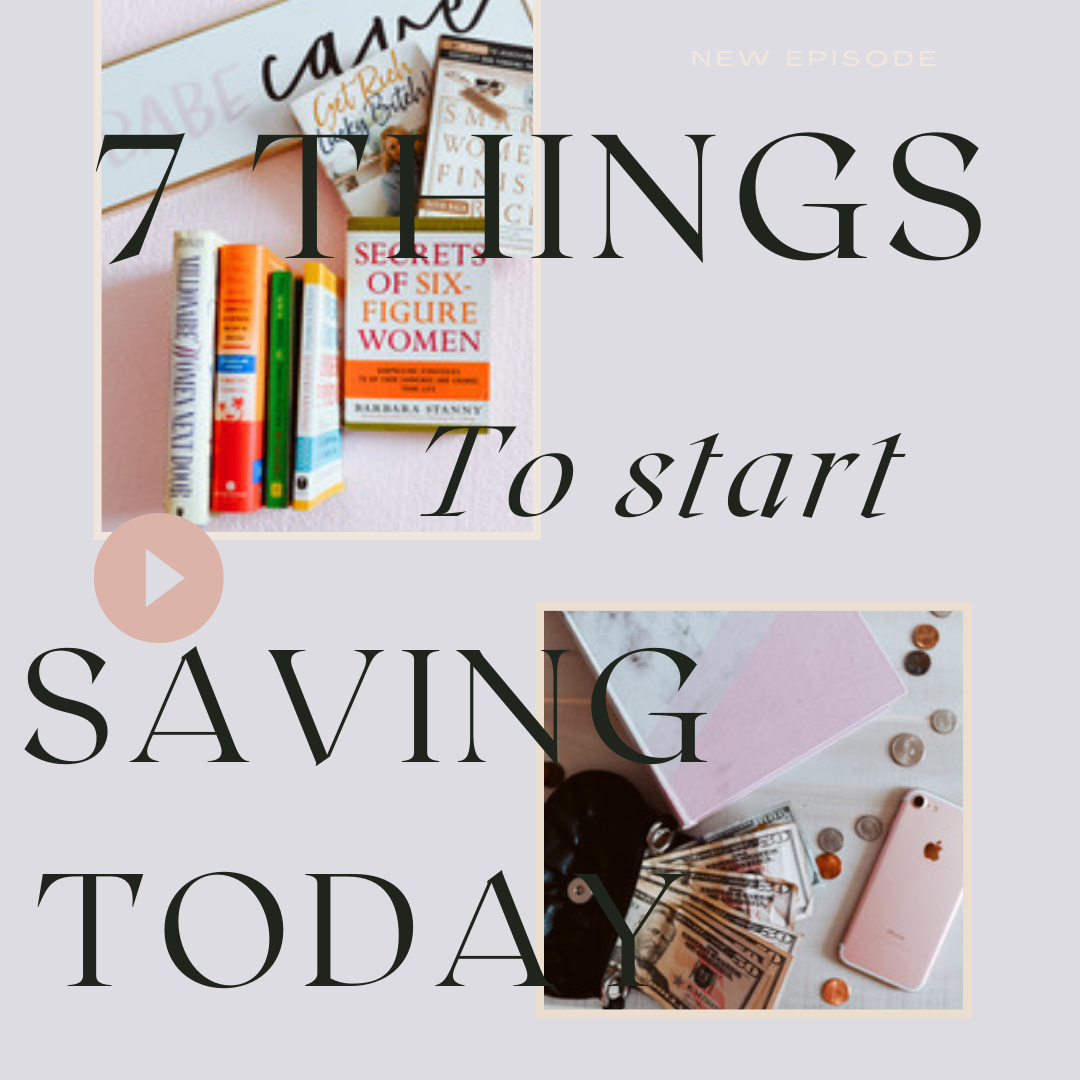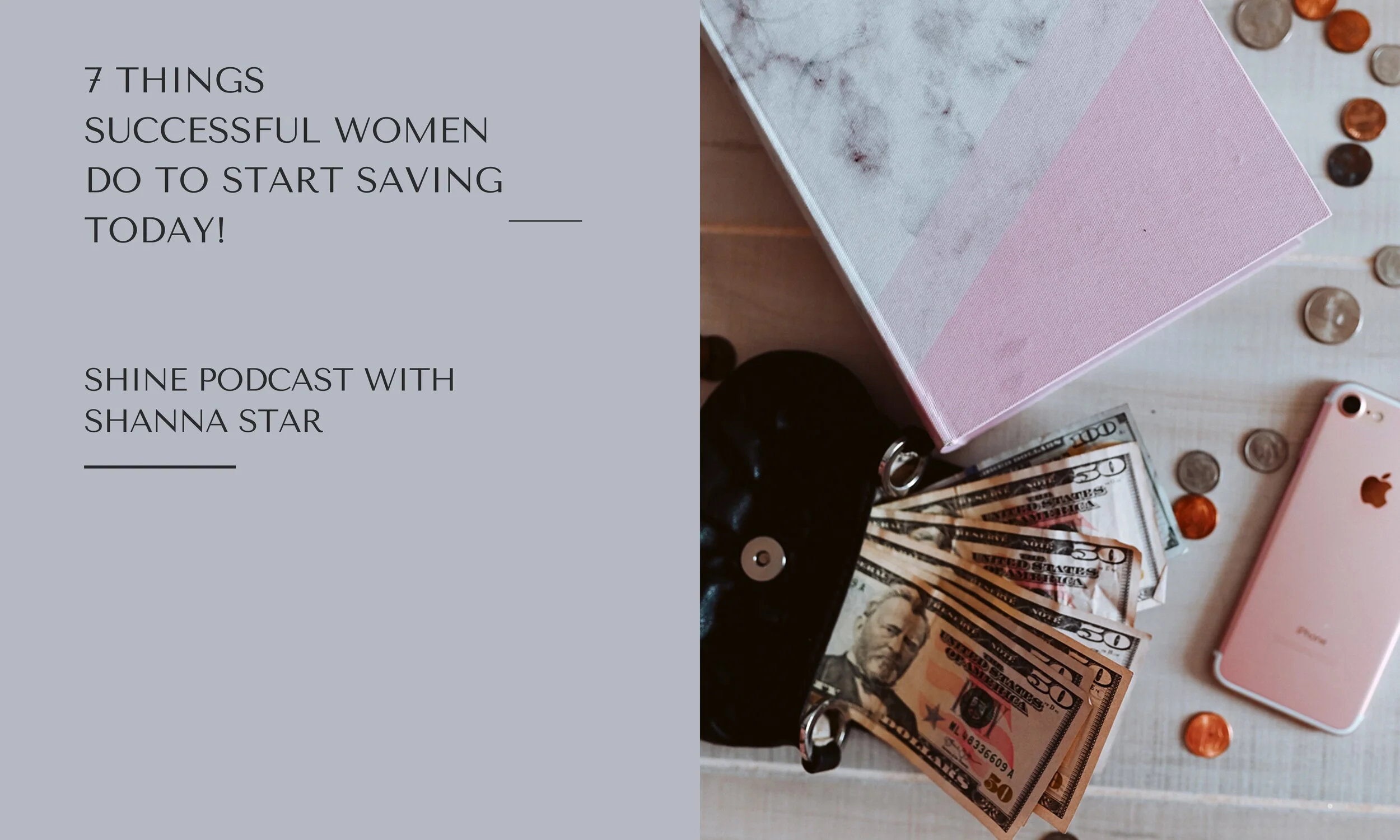7 Things successful women do to start saving today!

7 things successful women do with money to start saving today (financial habits that successful women have).
Follow The Shine Podcast on Apple Podcasts, Spotify, or IHeartradio
Below are a few books that motivated me to learn more about money and get excited about money!
Head to Episode 13 to hear more about how to save this month and where to cut in your budget!
this is a slow and steady process with intentional thought and action behind it, it’s not a quick fix, but these are some great things to start. I know just starting is sometimes the hardest, i now look back after only 1.5 years os starting and realizing and after a couple months it was easy to put aside money each money into accounts i know weren’t directly going towards essentials and a little extra. Keep in mind-These may not be the exact steps that make the most sense for you! My finances probably look a lot different than yours do! And that’s okay- these are just some basic steps and tips to get you moving in the right direction and working through YOUR personal finances to see what will work best for you to get out of debt, owning our money, and saving for the future.
So my personal example is this:When i got divorced i had no emergency fund, retirement, investments etc. I also at the time only had my car as a debt so i was lucky that way- but with nothing saved up, i realized how quickly i was going to be in need of that for my future- especially as a business owner i didn’t have that automatic 401k or even a steady paycheck with the sameish amount coming in every week. I was definitely overwhelmed starting over alone and in a new state with nothing saved up for the future. But i do want to encourage you you don’t have to do it alone. I spoke with a financial advisor, read financial books, mentors and people i trusted, and honestly my ex husband too as he could and can see my accounts so he knows what would make sense for me and when to push me slightly in a direction of something new. I didn’t do it alone with encouragement- i had help. And it’s okay to admit we don’t know what we don’t know. Looking back at high school and college i see what huge gaps are there and how personal finances should be a larger focus than what it was for me. So take the time to learn, understand it’s totally okay to be an amateur even though it’s scary to maybe admit being an amateur with something we all deal with but this is how you begin to grow. You have to be slightly uncomfortable to really grow in most areas, so this could be a huge step for that!
separate from your checking- to gain interest and so you don’t spend it. it’s for the future. it becomes fun because you’re telling your money where to go and how to. grow.
Number 1 way successful people start saving is
1- not afraid to know your finances and then budget.- your knowledge in numbers is power. a different level for goals and to help yourself and the world outside of yourself. and this means every aspect of your finances. this allows you to take action with confidence. Knowledge is power, numbers don’t have to be scary- I know a lot of people don’t want to see it, in hopes it’ll just get better. But if. you know those numbers you. can start to build your financial portfolio now. There’s a ton of apps out there, but i’m also including my free sheets again to add in.
the things that make us at comfortable at first, will help with growth the most. you’ll see where you can adjust to save the long run. This is where i still have a download for you i’ll attach in the notes so you can set up your finances more easily.
i didn’t really have to do this until after my divorce. yes in high school and college i had jobs, but my outlook at the time was just don’t spend anything- since my money was going towards school as much as i could, but i definitely didn’t have knowledge in it and it could’ve helped me save for the future. But after my divorce where i didn’t have an emergency fund, retirement, investments, nothing extra- i realized i was in a place of necessity to learn these things. i dove into books, i got an advisor, mentors, and honestly i also chatted with my ex husband who’s opinion on money i still greatly respect and plus- he knew my finances more than anyone and could still see my accounts, so i knew he’d be honest. you don’t have to go it alone, in fact if there’s someone that can go over it with you after you track everything- it’ll help keep you accountable and see where you can shift and adjust numbers for the future and maybe even suggest which accounts and funds are best for YOU to open. I’ll be suggesting some simple ways to start and what I did that worked for my finances at the time, and they’ll work for. you too. but that doesn’t mean it’s the only or best way depending on what your finances look like now. You might be working with a lot more money so setting up different investments might be best! but my finances were well pretty scarce so i had to set up accounts that would allow me accessibility.
Looking back at schooling- i realize we don’t learn really basic budgets, investments, and how to save for the future (especially if you’re not in the corporate world- example i don’t have a automatic 401K) more on that later.
Budget is the first way to really grab ahold and taking ownership of your money!
2- Debt. This is huge one - especially for those looking through finances- it might be more beneficial to pay off your debt before starting your savings, but these are numbers. you have to look at. There’s a lot of info out there about where to start with debt with a good rule is to still have about 1000 saved up and start chipping away at debt. Again each situation is different- look at the interest on your loans and makes sense for you! if they’re all about the same- there’s a snowball debt method to chip away at the lowest one first so you pay if off and have that feeling of accomplishment and then head on towards the next! This is one to really talk about with someone who knows your finances with more clarity but a huge goal should be to be out of debt (think loans and credit cards) Things like houses and cars can come later as you pay them off slowly.
3- start with an emergency fund. You can always push this money over to another account later but it’s wise to have an account that’s accessible to you if something happens to your AC, car, dishwasher, etc. You’re then not pushing too much money into an account where you can’t use it if you need- and i had a very minimal budget so like i said accessibility to another account was important for me at the time. Again if you make a lot of money, this isn’t necessarily the first step but you still should have a separate savings account NOT your checking. Emergency funds should be about 3-6 months of your living expenses. This alone might seem a little much but especially now, we see having extra money stashed away is vitally important. The first account to get started is always the hardest. It’s hard to part with that money even if it’s $20 and most experts say to have it automatically take from your checking a after getting paid and put right into your savings and while i agree- i don’t get that same paycheck like most so i’ve made it a game- beat my number from last month to put as much money as i can into my savings account. I wanted to build a a fast cushion and i’m thankful i did. I lived on very little, but it was the best decision, difficult for a while but now my money is sitting in accounts and growing for me.
this should go untouched unless you really do have an emergency but it helps you be confident when you do need it.
4- A long term savings. Again your portfolio might be different but after i had 3-6 months in my savings account, it was time to build a long term savings in a high yield interest account- meaning i get more money per month while it sits there- still accessible but a little more limitations on withdrawing- but nothing i’d get penalized for if i stay within the restrictions. So i’d push money into my emergency fund, and then every month push money into my long term savings.
People might instead turn to mutual funds, stocks, or other forms of investments, but being on a non-steady paycheck again i wasn’t willing to risk until i had my certain number i wanted saved. Granted, i DID hit those numbers in just 1.5 years after saving as much as i possibly could. and they weren’t small numbers- it’s completely possible to save up in a just a short time as long as you budget and for a short time make adjustments. You can still treat yourself or allow some new clothes or shoes, but it’s much more limiting especially with the food budget. That’s a HUGE cost that can literally save you hundreds a month if you adjust that part of your finances.
So if you have a savings account- get it into a high yield interest account so you can be making more money on the money already in there. it’s not difficult to do and doesn’t take too much time!
5- Retirement- IRA- okay this was for me since i said i don’t have the corporate job that can automatically give me the 401K but i knew i wanted a retirement fund and i felt ready enough with my accounts and accessibility to jump into a ROTH IRA. These accounts have more restrictions about withdrawing, when, how much, and how you’re charged if you do- which is why i waited a bit longer so i knew i wouldn’t have to touch that money. For me, the ROTH IRA makes the most sense, and also gives higher interest rate to make MORE money on the money you put into the account. There’s a ton of retirement options, so look into what’s best for you! I decided on this one, and then again my ex suggested i do this- and what i appreciate is he said i need to do it right now before the end of the year so i can gain as much interest as i can!
it’s a non negotiable in your journey- it’s important to talk to someone in it- i’m not an expert in what’s best for you but some of these tips are universal as far as having these accounts!
it’s necessary to pour your money into your business, but you need to need to live off of it later. If. you own a business this can be scary and i’m right there with you! i don’t have the same amount of money coming in every two weeks or even every month. I know what my bills are and from there can adjust my checking to reflect what i need for the month.
6- investments- This one might have come earlier in the game if you have some of those other accounts set up, which is awesome!- Investments like stocks and mutual funds are a huge learning curve and these are still a bit overwhelming for me so i have minimal in this area for now while i’m still learning and growing, but i was ready for a little risk so i decided on a few that i believed in, saw how it did over time and again- talked to someone who had more knowledge in it than me. Never be afraid to ask questions- the more you talk about finances i’ve seen the more it comes to you as you’re learning and growing in it. These type of accounts can be a such a great way to gain money in the long run too! so don’t dismiss it all together- do some research and talk to a few people who have been doing it with success!
7- set financial goals (no debt, limited good solid credit cards) and plan for the future. This one is going to be so different whether it’s helping save for your kid’s college tuition, short term and long term trips, giving back and paying off your house and more- this is where you can make these goals a reality when you have the other things in play. Most of the people i know personally could have tighter budgets by just spending a little time working on it at home and live with more financial freedom in just a few years, but it takes that first step- learning your finances and budget to get to this point. just baby steps, and although i was very lucky to not have huge debt when i moved across the country alone, in only 1.5 years i’ve set up 4 different accounts slowly and built healthy savings and i know you can too!
your goals might be totally different- but no matter what it is but it’s important to have goals and just spinning your wheels seemingly living paycheck to paycheck and not realizing you’re spending more than you realize on all those little expenses. the most important thing is you know your finances and what works best for you and your family steady shifts will help you be confident and grow your money.
you don’t have to have it all at once, one account at a time- and in a few years you’ll feel so much better and have more financial confidence. And that’s what i hope for you, that in a short time you’ll be telling your money where to go, how to grow, and saved up.
You. can also head back to episode 13 to hear more about budgets and. how to save money this month- what to cut out.
I will be adding in those spreadsheets for you to find at www.davistaphotography.com/shinepodcast/7thingstosave along with some books i recommend to not only get you. started but get you fired up too!
Keep Shining


